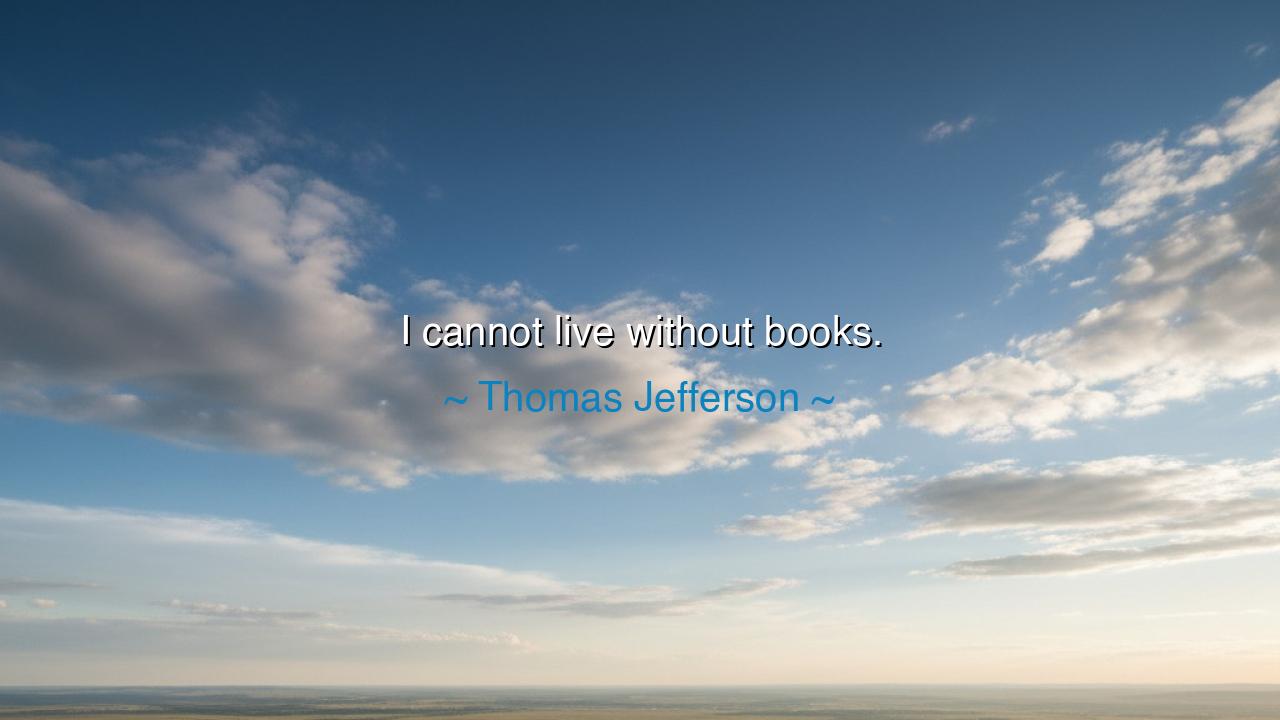
I cannot live without books.






"I cannot live without books." These immortal words, written by Thomas Jefferson, are not the mere sentiment of a scholar—they are the heartbeat of a man whose spirit was nourished by wisdom. To Jefferson, books were not lifeless objects of paper and ink; they were living companions, the silent teachers of civilization, the guardians of liberty, and the mirrors of the soul. In this brief declaration, he reveals a truth as ancient as learning itself: that the human mind, deprived of knowledge, withers; but when fed by thought, it grows strong and free.
The origin of this quote reaches back to the early 19th century, in a letter Jefferson wrote to his dear friend John Adams, his fellow Founding Father and intellectual rival. The United States was young then, its institutions fragile, its vision untested. Jefferson had retired to his estate at Monticello, surrounded by the hills of Virginia, seeking peace after years of leadership and conflict. But even in his retirement, his passion for learning did not fade. Having sold his vast personal library to Congress after the War of 1812—to replace the one the British burned—he confessed that he could not live long without books. And so, like a man rebuilding a temple after fire, he began collecting again, filling his home once more with the voices of the ages.
Jefferson’s love for books was not indulgence—it was sustenance. He saw in reading the foundation of freedom itself. For how can a nation remain free if its people remain unlearned? How can a man govern himself if he does not first govern his thoughts? Books, to him, were the weapons of the mind, the instruments of liberty. In them he found the wisdom of philosophers, the courage of revolutionaries, and the dreams of poets. Through their pages, he communed with Plato and Cicero, Locke and Voltaire. He drew from them the ideas that shaped the Declaration of Independence—the conviction that truth, once known, could not be chained. His phrase, “I cannot live without books,” was therefore not simply personal—it was the credo of enlightenment itself.
The ancients understood what Jefferson felt in his heart. Marcus Tullius Cicero, the Roman orator, once said, “A room without books is like a body without a soul.” To the Greeks, books were not only treasures of thought but vessels of immortality; through them, wisdom survived the fall of empires and the passing of kings. The libraries of Alexandria, Pergamon, and later the monasteries of Europe stood as sanctuaries of human memory, each book a flame passed from one generation to the next. When Jefferson filled his study with volumes, he was rekindling that ancient fire—one that illuminates not merely the mind but the destiny of mankind.
But books are not only for the scholar—they are for every soul that seeks meaning. Consider Frederick Douglass, who was born enslaved and forbidden to read. When he secretly learned the alphabet, a new world opened before him. “Once you learn to read,” he wrote, “you will be forever free.” The same truth that Jefferson, the statesman, celebrated from Monticello, Douglass, the former slave, discovered in the dim light of a Baltimore attic. In both men, books were more than education—they were liberation. And thus, the quote that once belonged to one man’s affection becomes a universal law: that the path to freedom, both of mind and of nation, begins in the pages of a book.
Jefferson’s devotion to books also reminds us that learning is not a phase of life but a way of life. He never ceased to study, to question, to grow. Even in old age, when his body weakened, his intellect soared. “I cannot live without books,” he said—not because they amused him, but because they gave his life purpose. The written word connected him to all who came before and all who would come after. In books, he found the dialogue of eternity—the ceaseless conversation between truth and time.
Let this be the teaching drawn from Jefferson’s wisdom: cherish the written word, for in it lies the power to refine the soul and redeem the world. Read not for vanity, but for virtue; not for escape, but for understanding. Surround yourself with voices that challenge and uplift you. For in an age when noise floods every moment, the quiet of a book remains a sacred refuge. As Jefferson taught through his life and his words, a man who reads is never truly alone, and a people who read will never be enslaved. So take up the book—not as pastime, but as companion, teacher, and key to freedom—for indeed, one cannot truly live without it.






AAdministratorAdministrator
Welcome, honored guests. Please leave a comment, we will respond soon